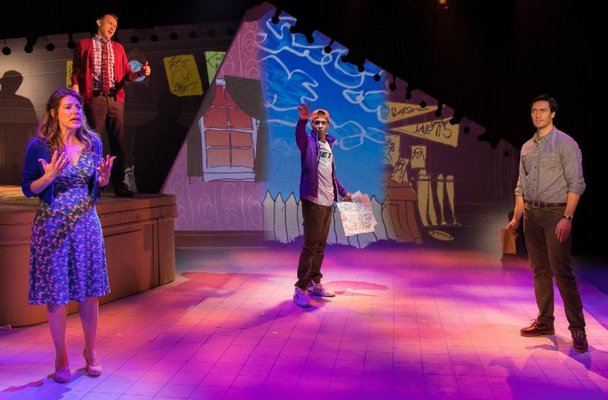
Joie de vivre spills off the stage in the world premiere of “The Man in the Ceiling” currently at Bay Street Theater in Sag Harbor. Based on Jules Feiffer’s young adult novel of the same title, this collaboration between writer Mr. Feiffer and composer Andrew Lippa bounces along with high-voltage energy to its exuberant end.
“The Man …” is the portrait of an adolescent as a cartoonist named Jimmy Jibbet beset with his father’s disbelief that those scribbles in the margins of his school books can ever amount to anything—certainly not a career. Jimmy’s grades are abominable, and he won’t play baseball either—while dad, a teacher and possibly the coach, wishes Jimmy would at least play ball. What will become of his son?
Jimmy’s mother is not much help either—she’s got a job, she’s on the phone, she’s barely paying attention. Her brother, Uncle Lester, is a composer who is unable to write a hit love song. Uncle Lester is played by Andrew Lippa, who is the show’s composer, but in real life has written a string of applauded songs and musicals. Mr. Lippa is also the force who bugged Mr. Feiffer for years to bring his book to life as a musical.
Uncle Lester encourages Jimmy to follow his calling, as does Jimmy’s bossy sister, Lisi, but it’s the imaginary man in the ceiling who is Jimmy’s true North Star. Dad eventually comes around, Mom pays attention, Uncle Lester doesn’t give up, and encourages Jimmy to stay the course. It’s a story many an artist of any ilk will find familiar.
But this is not a show in which the outcome is in doubt; we know how life turns out for Jimmy. He becomes Jules Feiffer. These childhood complications will eventually vanish and enormous success will come to Mr. Feiffer, who at 88 is possibly the most loved and honored cartoonist living today. His weekly strips with skinny gestural figures—usually hapless, always lacking confidence—for the Village Voice from the mid-'50s to 1997 are legend. He currently lives on Shelter Island. Full disclosure: I am fortunate to call him friend.
What the audience is there to do then is less to follow Jimmy’s progression than celebrate what will come. We are in attendance to share the joy, which the entire cast of six, under the dynamic direction of Jeffrey Seller, spreads around splendidly. With few speaking lines, they mostly sing and sometimes dance, and they keep the exuberance level red hot throughout.
As Jimmy Jibbet, Jonah Broscow—who turned 13 a few days ago—has the polish of a longtime pro.
As characters in the action, the actors are not only themselves as mother (Nicole Parker); father (Danny Binstock); sister Lisi (Erin Kommor); neighbor Charley Beamer (Brett Gray), and Uncle Lester (Mr. Lippa), but at times they are also Jimmy’s cartoon characters holding up images drawn by the inimitable Mr. Feiffer.
While there is a single physical set, Uncle Lester’s garret is up a few steps, a clever prop pulls out to be at various times, Jimmy’s bed, a dining table, his parents’ bed, perhaps a desk. But the real star of the set is the collection of Mr. Feiffer’s ever appealing drawings projected onto a white background. With the magic of Howell’s Binkley’s lighting, the background shifts at least a dozen times to be Jimmy’s bedroom, his father’s trophy-laden study, outdoors, a cartoon hand, the parents’ bedroom, a dining room, a blood-covered page, a cartoonist’s studio, a looming garbage bag that is part of the story, even Uncle Lester’s critical audience at a backer’s audition.
The man in the ceiling appears himself to speak to Jimmy in the form of a fabricated, ghostly character managed on poles by the cast. Together they provide his voice. In all, it’s an appealing effect.
While all this is good, musically the show doesn’t rise to Mr. Feiffer’s contributions.
Except for the haunting ballad “Disappear,” sung movingly by both Ms. Parker and Mr. Binstock to each other, the first act with seven other songs has too many times when the performers are singing different lines at each other making the lyrics especially difficult to understand. The fact that the actors are microphoned as if for a huge Broadway theater doesn’t help in the more intimate setting of Bay Street. The unfortunate result is at times cacophony.
Things brighten considerably in the second act with several numbers that lift the ballast: “Kidding Around,” “To the Gods,” “You Are the Friend,” Uncle Lester’s love song; and the finale, “Draw Your Own Conclusion,” which gives the life advice of its title. I’m admittedly easy, and I had the same familial disbelief and opposition when I was growing up as Jimmy, but still, a moment in that song drew a tear from me as well as my partner.
Spencer Liff’s choreography for a small troupe as this is engaging throughout, and particularly amusing when they briefly emulate a full-fledged chorus line a la Broadway. They fill the small stage at Bay Street and make it seem larger than it actually is. The show’s live music under the direction of Ryan Fielding Garrett—piano, viola, cello, percussion—adds to the experience.
“The Man in the Ceiling” is not quite a comedy—it’s too sweetly agreeable for that—but some of the lines are indeed comic, as when Jimmy asks his dad: “If I'm gonna grow up, what are my rewards?”
Answer: “One of the many, many, many rewards in growing up is that you learn to accept responsibility.
Jimmy: “That's a reward?"
The reward here is leaving the theater energized, particularly if you drew your own conclusion, even if you are not exactly humming a tune.
"